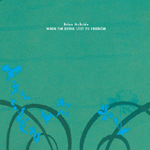 Each song on this record illuminates a sense of loss, like leaving Chicago was akin to losing a lover whose influence was indispensable and comforting. Employing violins, guitars, trumpets, pianos, vocals, harmonicas, and a whole host of instruments I won't bother naming here, McBride has produced a symphonic record that may well suck most audiences right in and cast them into orbit.
Each song on this record illuminates a sense of loss, like leaving Chicago was akin to losing a lover whose influence was indispensable and comforting. Employing violins, guitars, trumpets, pianos, vocals, harmonicas, and a whole host of instruments I won't bother naming here, McBride has produced a symphonic record that may well suck most audiences right in and cast them into orbit.Tension is a quasi-necessity in the musical world. Without it music can sound painfully empty or end up entirely boring because it just doesn't have that ooomph so many feel when listening to good music. Plenty of music pretends to produce friction or emotional weight in the content of its lyrics or through the thickness of its instruments, but there is no great difficulty in discerning the pretenders from the genuine article. Listen to the radio for a little while and then grab a Stars of the Lid record and draw a comparison between the two. One will sound flighty, packed full of fraudulent significance and pressing seriousness, trying way too hard to dig into the meat of adolescent trials and the other will be hypnotic, purporting nothing other than the nudity of its sounds and the real stress generated by the interaction of the instruments. It's a world of difference hearing real tension in a song, especially when Brian McBride is responsible for all the weight and gravitational pull on a particular song, let alone a full-length album. When the Detail Lost its Freedom was conceived as McBride made a move from Chicago to Los Angeles.
His sounds push and pull, generating a feeling of desolation and unnecessary pain not unlike the feeling I get when standing at the precipice of a large and open space. I could get lost in such a space and do often get lost inside this album. The way these sounds play off each other, the way one enriches and imbues the other with new meaning and significance, evidences how carefully much of this record must've been put together. Some of the signature Stars of the Lid techniques are to be found throughout, especially when the album opens and "Overture (for Other Halfs)" unfolds like a blanket of warm air. The shimmering, muffled timbre of violins isolates everything else, dreams them all away, and completely surrounds every thought that might threaten to invade the sanctity of the moment. It's a completely submissive experience because it is impossible to get away from the space the album opens up.
Once the shining, less compressed strings wind up out of the darkness it's impossible to get away from the album. It's a lonely and powerful experience that only a talented musician like McBride could deliver. Despite its more classical leanings and tight structure, the album feels free and absolutely organic. Had McBride been around to talk with Kubrick during the make of 2001,some of this material might've found a home in the movies and in space.It's finally that natural, human element of this album that become mostdistinct and most attractive. Without flashy production, without aflashy image, and without a super-fast riff or commercial hook, McBridemanages to create all the gravity in the world and tug on all theemotions related to loss and reflection.
samples:
Read More

